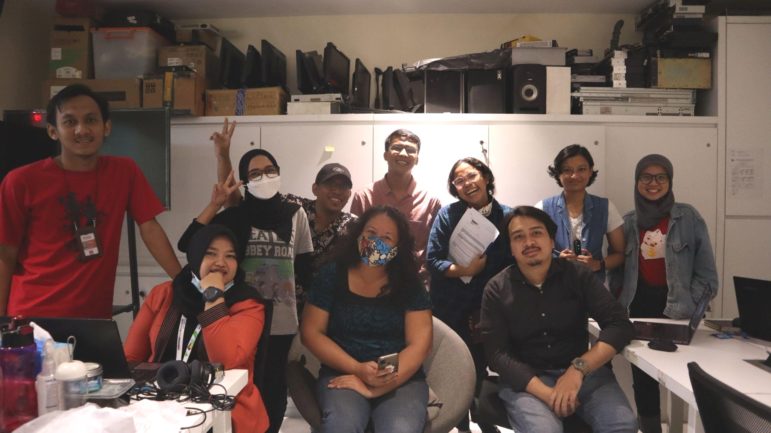

Photo: Unsplash
Dollars for Data Journalism: How One Project Makes Money by Selling Data on Police

Photo: Unsplash
Editor’s Note: Erika Owens, the director of OpenNews, recently interviewed data reporter Stephen Stirling to find out more about the Force Report, a police accountability project from NJ Advance Media. The largest source of local digital news in the US state of New Jersey, NJ Advance Media launched the project last year and it’s still making an impact. Owens especially wanted to know about NJ Advance Media’s choice to sell the data that powers its project, while still keeping the database free for the public. There are lessons here for independent media doing data projects around the world. Here’s what she learned.
Erika Owens: Can you tell us more about the Force Report’s data, being made available in ProPublica’s Data Store?
Stephen Stirling: We published the Force Report back in the fall of last year, and we made a lot of the data we had public. As a refresher: We took about 72,000 largely paper records of use-of-force reports, from every police department in the state of New Jersey, of which there are 467. We digitized them, put them into a database, and analyzed it. Ultimately we found incredible disparities occurring both in general, in terms of how one department was using force as opposed to others, but also along racial lines statewide. We ended up producing some really valuable journalism that led to a lot of action at the local and state level.
A decision we talked about early on was ultimately selling this data. We wanted to strike a balance between making as much of it public as possible — all of the data is searchable at force.nj.com and people can look up their department, any officer in the state, and get all the information we have on it. But if people wanted to do research based off of it, we wanted to give an option for people to download the whole dataset.
Selling it would also be worthwhile because part of what we have to consider right now is that the work we do has value. Beyond the man hours we put into it, it cost more than $40,000 to produce. For a regional news organization, that’s no small fee. We ended up partnering with ProPublica and putting it up on the data store in a tiered format so that different groups could purchase it if they wanted to use it beyond what we have on force.nj.com, as well as the aggregate data on data.world.
Owens: It was so tremendous hearing about the massive effort that went into acquiring and cleaning this data. I don’t feel like I hear a lot about newsrooms thinking about selling the databases they put together. How did it occur to you?
Stirling: I brought it up to our editor toward the end of the project production because I’ve been following ProPublica using this as part of their business model for a long time and seeing that they had some success. The sole purpose was to make the information public and in an easily digestible format. So we wanted to do that. But we also wanted to see if we could recoup some expenses … Ultimately we found a compromise, making sure we were balancing our mission of being transparent and making it public.
Owens: It’s so helpful to hear a little more about that conversation. I’ve been really bowled over hearing about ProPublica talking about the Data Store but haven’t heard as many examples of people being able to build on that success. Is there anything you can share about how much people have bought it, or what the response has been?
Stirling: We don’t know who is purchasing it or anything like that. We also don’t have much of a gauge for what’s successful. As far as ProPublica tells us, it has been one of the more successful databases on their site. Most notably, the one thing I can say because it was brought up at a public hearing: The State Attorney General of NJ purchased the data, which is a remarkable thing. We received an open records request from them. They asked us to give it to them for free. At the end of the day, the state of New Jersey, seeing the value in what we did, ultimately purchased the data from us in order to build their own system. They are certainly not the only ones. Before it was even made public, there were people inquiring and purchasing it through their database managers. If it made any money it would be a success, because we’ve never done it before. I can’t do anything but call it an unequivocal success. Hopefully we can build on that.
Owens: Do you have a sense of whether the unequivocal success will make future buy-in easier to get?
Stirling: I think so — first and foremost, it’s great to have the support of management here to do it in the first place. If that money isn’t disappearing in a vacuum, if you’re getting some back in a separate revenue stream, money is money … If we’re willing to put money toward investigations like this, it benefits us in one way or another. We’re all struggling to find that revenue solution that keeps news organizations afloat. Based on the fact that we’ve had support before, and that to my knowledge it’s the first investigation that has started to make money for the company, I don’t see why they wouldn’t support this sort of thing in the future.
This article first appeared in Source and is reproduced here with permission.
 Erika Owens is the director of OpenNews, a Knight-Mozilla program that connects a network of developers, designers, journalists, and editors to collaborate on open technologies and processes within journalism. She previously coordinated the Knight-Mozilla fellows program.
Erika Owens is the director of OpenNews, a Knight-Mozilla program that connects a network of developers, designers, journalists, and editors to collaborate on open technologies and processes within journalism. She previously coordinated the Knight-Mozilla fellows program.









